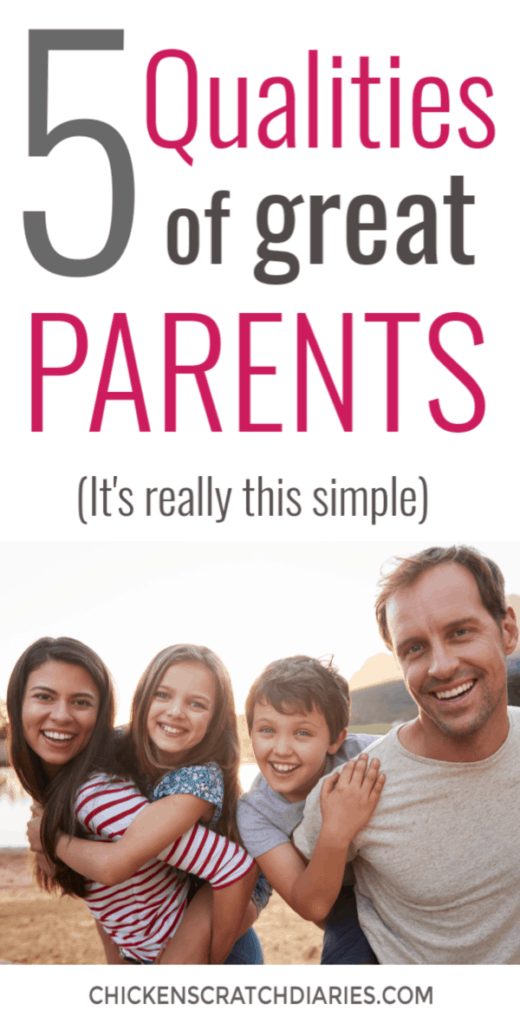
Have you ever wondered if there are certain traits that good parents share? This post by guest writer, Mary Ann Blair, explores what makes a “good parent” by noting 5 qualities that can transform your family relationships.
From the moment your sweet baby is placed into your arms, there is nothing you desire more in life than to be a good parent to this precious miracle you have been gifted with.
If only kids came with detailed instructions!
So often as new parents, we end up feeling like we are flying by the seat of our pants, struggling to figure out the best way to handle each parenting challenge and just hoping for the best.
Through seven years of live and learn moments, seeking out numerous parenting resources, and spending many hours reflecting (AKA lying awake at night worrying I was messing up big time), my approach to successful parenting has definitely evolved.
What does it mean to be a “good” parent anyhow?
While I don’t believe there is only one “right” way to be a good parent, there are certain choices I have made along my own parenting journey that have enhanced my ability to parent my kids well.
And from my observations, there are certain characteristics that seem to be at the top of the list when it comes to effective parenting. To any parent who is wanting to improve their relationship with their child(ren), be encouraged: it’s not as complicated as we often think!

This post likely contains affiliate links. Please see our disclosure for more info.
Here are five qualities of good parents – according to experts, and my own experience in the “what really works” department.
#1. They use positive discipline.
Let me be perfectly honest; figuring out a discipline approach that worked well with my kids was a struggle for me. I tended to be either strictly authoritarian in my approach and dished out punishments like they were Halloween candy, or I was way too permissive after worrying about being too harsh.
A parenting webinar led me to Dr. Laura Markham and her book, Peaceful Parent, Happy Kids: How to Stop Yelling and Start Connecting. This book completely changed how I thought about discipline.
Honestly, when I was first learning about the concept of positive parenting, I was pretty incredulous. How could I effectively discipline my kids without using punishment? Wouldn’t that permissive style of parenting create spoiled little monsters?
Here is what I’ve discovered: practicing positive discipline actually decreases the amount of behavior problems I have with my kids.
What positive parenting actually is – and what it ISN’T
According to Dr. Markham,
“The permissive style avoids setting limits and high expectations. Kids who never need to manage themselves to accommodate limits and rise to expectations have a hard time developing self-discipline.”
On the other hand, parents that focus on positive discipline (also called the authoritative style – not to be confused with authoritarian) “offer their children lots of love and support, like the permissive parents. But they also hold high expectations.”
The key to this style of discipline, according to Dr. Markham, is using empathy with limits.
Instead of just handing out punishment as a knee-jerk reaction and hoping they would “learn their lesson” from the punishment, I began trying to understand my children’s point of view and the reasons behind their behavior.
I started taking the time to help my kids label and better understand their own emotions. In turn, they are learning how to understand the emotions of others and develop empathy.
Read Next: The Importance of Disciplining our Kids- and the Top Reasons we Hesitate
I still have high expectations and set clear boundaries, but discipline has become more about teaching than punishing. This type of approach fosters a stronger connection, and strengthening the connection with my kids has led to fewer behavior problems.
#2. They make a repair quickly when there is a rupture in the relationship.
According to the book Raising a Secure Child: How Circle of Security Parenting Can Help Your Nurture Your Child’s Attachment, Emotional Resilience, and Freedom to Explore by Kent Hoffman, Glen Cooper, and Bert Powell, as the parent we should always try to be “bigger, stronger, wiser and kind.”
Setting limits in a kind, firm way is certainly an ideal worth striving for.
But friends, we are all human, and parenting is the hardest job out there. You will lose your patience and you will say and do things you wish you hadn’t. You will not always be kind in your approach or your reaction.
Ruptures in the relationship with your kids will occur. You will get angry, you might yell, you might throw a temper tantrum that could rival your two-year-old’s.
In these instances, do whatever it is you need to do to calm down and make the repair with your child.
And then, take heart. When we make mistakes and apologize, our kids get to see it’s o.k. to mess up. They will know they don’t have to be perfect either.
#3. They learn how to turn down the “shark music”.
What is shark music? It’s the background chatter in our head—usually based on something from the past or a future fear—that can affect how we react to our children’s behavior.
In their book No-Drama Discipline, Dr. Daniel J. Siegel and Dr. Tina Payne Bryson explain that shark music “keeps us from parenting this individual child in this individual moment.”
Here is an example:
Last summer, we took our kids to an amusement park. My six-year-old and I had been butting heads a bit on this trip—mostly from travel stress and lack of empathy on my part. It was going to be a long day of walking, so we rented a double stroller for him and his little brother. When he refused to sit in it, my shark music started blasting and it sounded something like this:
“Here we go again, he is being defiant for no reason!”
“Am I going to struggle with his bad attitude the entire day?”
“Why can’t he just cooperate? What’s the big deal about riding in a stroller?”
I took a deep breath, knelt down to his level and asked him why he didn’t want to ride in the stroller. With tears in his eyes, he looked up at me sadly and said “Mom, if I ride in the stroller everyone will think I’m a baby. And I’m not a baby anymore. I’m a big kid!”
At that moment, I realized the shark music playing in my head hadn’t allowed me to even consider his point of view.
I assured him that no one would think he was a baby, but rather that he was being an awesome big brother by keeping his little brother company in the stroller. He hopped right in and didn’t complain about it the rest of the day.
It was a great learning moment for me; rather than assuming he was just being defiant, I needed to turn the shark music down and dig deeper to discover what was really behind his protest.

#4. They prioritize self-care.
Some of you might be thinking “That sounds fabulous, but who has the time? My family’s needs should come first.” I used to feel that way too, until I realized what a difference self-care made in my ability to parent well.
Regardless of which stage of parenting you are in, I urge you to figure out a way to take some time to recharge your own batteries.
Maybe that means hiring a babysitter. Maybe you can arrange a babysitting exchange with one of your friends. Maybe you can put your kids to bed a half-hour early or let them watch an extra half hour of tv.
Just do it!
When I’m not intentional about self-care, my attitude, my patience, and my empathy all take a nosedive. I become resentful and cranky. I have found even a half hour to myself makes a huge difference.
Taking care of yourself is not selfish. Taking care of yourself means you are better able to take care of those you love most.

#5. They let go of the guilt.
When you become a parent, you begin to experience guilt on a whole new level.
You desperately want time away from your kids? Parent guilt. You couldn’t breastfeed for the recommended year? Parent guilt.
Your child didn’t have the Pinterest worthy birthday party like his classmate? Parent guilt. You lost your patience and yelled? Parent guilt.
You have to work full-time and can’t spend as much time with your kids as you would like? Parent guilt. You are staying at home full-time and can’t afford those “extras” for your kids when you’re on a tight budget? Parent guilt.
Guilt tends to weasel its way into our hearts suck out our joy. When we are mired down in guilt, we can’t be the best versions of ourselves for our kids.
So let me ask you a few questions.
Are you doing the best you can with the resources that you have?
Do your kids know you love them to the moon and back?
Do you continue to show up day after day for the people you love, despite the challenges life has thrown your way?
I’m going to guess you answered “yes” to all of those questions.
Let. Go. Of. The. Guilt.
There’s no perfect parent
Spoiler alert: You and I will never become perfect parents. If our goal is perfection, we will never achieve it.
But we can always take new steps that will positively impact our parent/child relationship.
And truly, that is what being a “good” parent is all about.

About the author: Mary Ann Blair is a stay-at-home mom living in the Pacific Northwest with her two little gentlemen and hubs. She loves connecting with other parents who like to keep it real! Her writing has been published on Her View From Home, Perfection Pending, That’s Inappropriate, Pregnant Chicken, Sammiches and Psych Meds, Red Tricycle and in Chicken Soup For the Soul. She can be found at www.maryannblair.com and Facebook.com/MiraclesInTheMess.

You might also like:
7 Distress Signals of Moms Who Do Too Much
How to be a Calm(er) parent you can be proud of
Formula for Happy, Self-Motivated Kids

hi
I am mother of 4 year old boy.we are trying to be a good parents. whenever we talk slowly and explain the situation with my kid but he cant understands. again he will do same thing. we are controlling my patience,but sometimes we can’t. can you please tell me some tips?
thanks,
harathi.
Hi there – it might help to know exactly what type of misbehavior you’re dealing with; however, if you’ve explained what he is doing is wrong and he is repeating the behavior, it’s time to enforce a consequence. For instance, if you tell him he can’t climb on a bookshelf (for example) and redirect him to another activity, and he goes right back to it, you could take him to his room for a little “quiet time”. You can say again, “we play on the floor, not the bookshelf because that’s dangerous”, and tell him he can come out when he’s ready to obey mom and dad. If he throws a fit, just stand by the closed door and don’t let him open it (stay calm), and remind him he can come out when he’s calm. That’s one of the techniques used in Love and Logic– you might like that book too! Best of luck.
This was great advice. I like the approach, especially about self-care. When I’m being too negative with my parenting I try to look at what I might need to feel better and be a more patient mom.